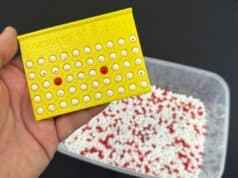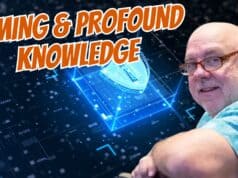Mark's Note: Here's another guest post from a new blogger, Brian Moore, on the topic of Lean and sustainability, or what many call “green” initiatives.
By Brian Moore
 I used to like the slogan, “Lean and Green are two sides of the same coin.” I even used it as a tagline in presentations in which I was arguing that there is a potential for significant synergy between the Lean and sustainability programs in my company.
I used to like the slogan, “Lean and Green are two sides of the same coin.” I even used it as a tagline in presentations in which I was arguing that there is a potential for significant synergy between the Lean and sustainability programs in my company.
Subsequently, however, I've cooled on the use of this expression and I'm grateful to have the chance, here in the Lean Blog, to explore the reasons I now would like to see it “disavowed.” I would not put that tagline in a presentation today.
It's not just that I just remembered Dr. Deming's Point Number 10, “Eliminate slogans….” This is not really the kind of exhortational slogan he found to be problematic. And it's not that I no longer believe in the mutual relevance of Lean and sustainability – in fact I'm more passionate about this reality than ever.
In most cases, when Lean practitioners take waste out of a process, they are also reducing harm to the environment. Reducing transportation, defects, overproduction, over processing, or inventory almost always also reduces energy use and water use, emissions, pollution, garbage, land fill volume, depletion of materials, and other environmental wastes.
Producing with less resources not only saves money, it saves stress on the environment.
As Toyota's website puts it:
“We believe the best way to impact the environment is to have as little impact as possible. That's why we rely on a rigorous and efficient operations process that limits the amount of energy and water we use and the amount of waste we generate. Done right and responsibly, we feel it's a perfect example of how to reconcile nature with the nature of doing business.”
And looking at influence in the other direction, a sustainability program can strengthen Lean through its inherent focus on long-term thinking, its emphasis on respect for people and the environment, and its intent to deeply engage all employees. Staff who become expert at seeing environmental waste are also going to become good at seeing muda in work processes.
So, if I'm OK with non-exhortational slogans and if I see likely synergy, what's my problem with putting Lean and Green on the same coin?
Mark Graban's blog is a great place to answer this, because a primary concern is that doing so leads to confusing Lean with what Mark calls L.A.M.E. (aka fake Lean). In addition, the slogan undermines what I believe to be the goals of sustainability by propping up the continued use of the term “green.” As I explain the cause of the problems below, we'll see that “L.A.M.E. and Green are two sides of the same coin,” might be a better slogan.
Using “green” as a short hand for sustainability in our slogan, or elsewhere for that matter, presents both surface-level and deeper, more fundamental problems. The surface level problems come from the common use of the word as part of “green-washing,” where a product or service (see greenwashingindex.com or thegreenwashingblog.com for examples) is proclaimed to offer “green benefits,” but in fact may actually have an environmental “footprint” that is similar or even larger that a “non-green” product. When people develop cynicism about green product claims they may well begin to extend that cynicism to the sustainability programs, or if our slogan is being used, to Lean programs as well.
Problems at a more fundamental level come from the reality that being green is not the same as being sustainable. Being green is primarily about being less bad, and so it follows that you could make a company perfectly “green” by stopping its operations. Of course, no one actually proposes this, but this illustrates the logic of green. “Greening” a company may actually make it less sustainable, because, in the limit, -a company that is not producing anything is not enabling its employees to make a living, providing value to its customers, , or contributing to the wellbeing of society. A company focused solely on minimization will not be around very long and really won't help humanity much either. Just as you can't make a Lean company by simply laying off employees, you can't make a sustainable one by just eliminating resource use.
In contrast to green's sole focus on eliminating, sustainability requires creating. There are many definitions of sustainability these days, but the best are converging on something like that in Adam Werbach's Strategy for Sustainability: “Sustainable business means thriving in perpetuity.” This definition clearly raises the bar from green, because you can't create a thriving business by simply shutting everything down. John Ehrenfeld makes a similar statement in his important book Sustainability by Design: “…the most basic symbol of sustainability is that of flourishing….”
fEquating sustainability with thriving or flourishing not only raises the bar, it forces us to accept a point that Ehrenfeld makes that gets at the root of the problems with L.A.M.E and green: “reducing unsustainability, although critical, does not and will not create sustainability.” At the societal level, it is not enough to eliminate emissions, we also must provide food, medicine, education, and opportunity for people. In a company, we want to delight customers and prosper over the long term. At the personal level, we want to enjoy life, grow, and contribute to society. It is not enough to simply reduce our footprint.
In the year 2050, the global population is expected to exceed 9 billion. It is my strong belief that maximizing the synergy between Lean and sustainability will be essential to creating a world in which those 9 billion can live good lives while also staying within the carrying capacity of the planet. I also believe that, should we “choose to accept this mission,” we will strengthen our lean practices and cause them to become more rewarding.
 About Brian Moore: Brian Moore is a Certified Raytheon Six Sigma Expert and leads his company's award-winning IT sustainability program that has reduced electrical power demand by over 4 megawatts and generated over $33 million in annual savings Global recognition of this program has included five industry awards including, most recently, the Brill Award for Efficient Information Technology from the Uptime Institute. This spring the “Global e-waste program” he led won the 2015 Raytheon Six Sigma President's Award. Brian is also a member of Raytheon's Sustainability Core Team, is the author of IT Sustainability for Business Advantage, published by Business Expert Press, and speaks at IT and sustainability conferences. Brian has a BS in Chemical Engineering from the University of Colorado and an MA in Interdisciplinary Studies from the University of Texas at Dallas. You can follow him on twitter @createsust or via his blog at createsust.com
About Brian Moore: Brian Moore is a Certified Raytheon Six Sigma Expert and leads his company's award-winning IT sustainability program that has reduced electrical power demand by over 4 megawatts and generated over $33 million in annual savings Global recognition of this program has included five industry awards including, most recently, the Brill Award for Efficient Information Technology from the Uptime Institute. This spring the “Global e-waste program” he led won the 2015 Raytheon Six Sigma President's Award. Brian is also a member of Raytheon's Sustainability Core Team, is the author of IT Sustainability for Business Advantage, published by Business Expert Press, and speaks at IT and sustainability conferences. Brian has a BS in Chemical Engineering from the University of Colorado and an MA in Interdisciplinary Studies from the University of Texas at Dallas. You can follow him on twitter @createsust or via his blog at createsust.com
What do you think? Please scroll down (or click) to post a comment. Or please share the post with your thoughts on LinkedIn – and follow me or connect with me there.
Did you like this post? Make sure you don't miss a post or podcast — Subscribe to get notified about posts via email daily or weekly.
Check out my latest book, The Mistakes That Make Us: Cultivating a Culture of Learning and Innovation:









